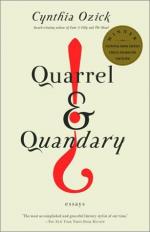|
This section contains 10,294 words (approx. 35 pages at 300 words per page) |

|
SOURCE: Alkana, Joseph. “‘Do We Not Know the Meaning of Aesthetic Gratification?’: Cynthia Ozick's The Shawl, the Akedah, and the Ethics of Holocaust Literary Aesthetics.” Modern Fiction Studies 43, no. 4 (winter 1997): 963–90.
In the following essay, Alkana offers a positive assessment of The Shawl, noting Ozick's stance against universalism in stories such as “The Shawl” and “Rosa.”
For American Jewish writers, the Holocaust remains a compelling subject for fiction; and their work constitutes an ongoing reply to Theodor Adorno's famous claim “that it is barbaric to continue to write poetry after Auschwitz” (87). The task of telling Holocaust stories has involved a recognition that beyond the fundamental value of presenting witness and survivor accounts, whether in nonfictional or fictional forms, there is value in telling more stories, particularly stories of life after Auschwitz. A work such as Art Spiegelman's Maus features a self-conscious narrative style that addresses this as an imperative...
|
This section contains 10,294 words (approx. 35 pages at 300 words per page) |

|


